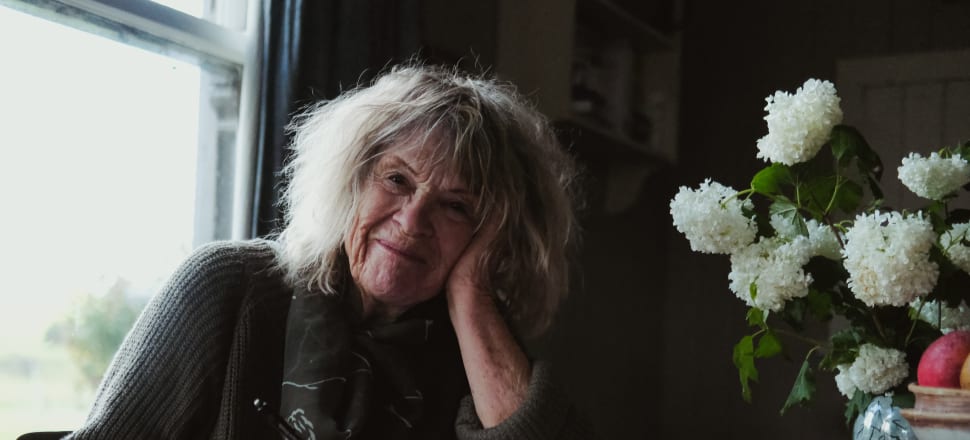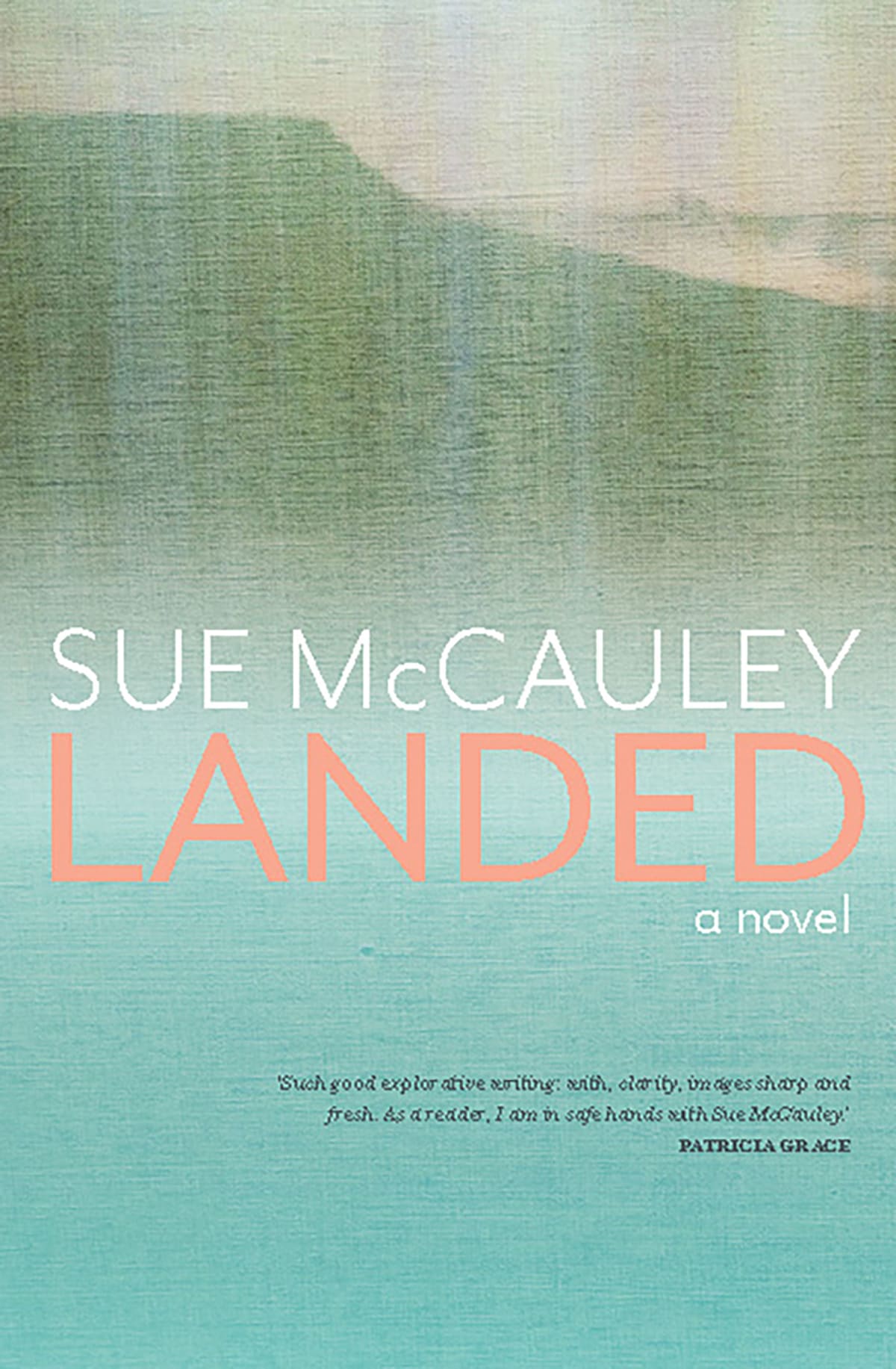
Scones, Ron Brierley, Timaru: a portrait of a vulnerable older woman
Bette Davis got it right when she famously once said, “Old age is not for sissies." With her latest novel Landed, Sue McCauley has created an empathetic portrait of a naïve and vulnerable older woman who struggles to reinvent herself after a tragedy leaves her bereft. This character-driven novel shows just how hard it can be to keep picking yourself up and dusting yourself off when traumatic and unexpected events just keep rolling in – mini-tsunamis that cumulatively diminish a person’s life.
Briar is an authentic and convincing character. She endures. And endures. There’s something to be admired about her stoicism in the face of adversity, even if she’s a character you wish, through the novel, would actually do something. Go somewhere. Anything but continue to stagnate in Timaru (not that I’ve got anything against Timaru!)
The inciting incident takes place on page one and sets a novel off to a cracking start. On a Saturday in Timaru in 1986 a policeman informs 63-year-old Briar that Brewer Howland, her husband of 28 years, has committed suicide. Her first response is shame. “What kind of wife could fail entirely to notice her husband’s suicidal despair?” She has no idea how to respond, or to know what’s normal in the circumstances. A timid, unconfident woman, she wonders what her husbandless future will hold in store for her – “A life without purpose; a void.”
A quick rummage through the files in his father’s study by youngest son Martin uncovers the extent of Brewer’s debt, a likely motive for the suicide. The news that they had been living beyond their means for years stuns Briar, who had unwisely relegated all household account management to her husband. “Mum’s generation, husbands still get to handle the money,” says oldest son Tim. And of course only the husband’s name was on the house title. It would have been helpful to have seen something of Briar’s internal response at hearing the debt exceeded the value of the house and assets, requiring the sale of the marital home.
This isn’t the first time that Briar has been abandoned. Her first husband Harry, a womaniser and liar, jumped ship, leaving her as sole parent of a seven-month-old baby and a four-year-old. Briar later bore a third child with Brewer.
Both of her husbands “have removed themselves without prior discussion or warning . . . neither had bothered to leave her a note. A sentence. A single kind word.” Briar recalls her late husband Brewer being “affable, generous, uncritical and occasionally humorous. Her life had felt safe.” We are told that Briar feels anguish. Ideally, the reader needs to be shown something of this anguish, to feel closer to her.
Briar loves her adult children and grandchildren, although she doesn’t really know them. But then she doesn’t seem to know anybody terribly well. She appears, in fact, to be friendless in Timaru. This was puzzling, because she seems a nice-enough, inoffensive woman. Women’s friendships would have added some texture and shown another side of Briar – someone capable of having fun.
In the weeks and months after her husband’s untimely death, as her life shrinks, Briar flounders. She increases her work at a bookshop – where she earns little more than a minimum wage. The family house is sold, leaving her with “a unit in Timaru, a job, a dog and money in the bank”, thanks to a small family inheritance. She has no idea what to do next. An understandable response, but something needs to happen, a sense of forward momentum, ideally driven by Briar.
One son plays the stock market and loses money in the 1987 crash. He bounces back and switches to importing poker machines
Briar’s story is set against a background of intense social and political change in New Zealand in the 1980s and early 90s. There’s mention of local “thirty-something ‘high-flying’ company directors who are already worth several million”, names of well-known corporate raiders such as (the later-disgraced) Ron Brierley and Allan Hawkins, and the reduction of tariffs.
Her children’s lives mirror the neo-liberalism and restructuring of the 80s that upturned the status quo. One son plays the stock market and loses money in the 1987 crash. He bounces back and switches to importing poker machines. Another son loses his job at the Government Printing Office, struggles to find work, and defaults to becoming a househusband and then a single parent. Her daughter, whom Briar had not expected to amount to much, unexpectedly pulls her life together.
Briar feels out of step with the era in which she is living, threatened by new technology and changing values, the “throwaway society”. She recalls with wistfulness her golden childhood years spent on the family farm: the horses, the dogs . . . “the whispered crackle of oilskin. Ice on the water troughs, snow on the ranges, the smell of scones cooked on the griddle”.
After her brother’s funeral she offers to buy the property from her sister-in-law. But in an opportunistic move, and without informing Briar in advance, the farm is instead flogged off to an American developer.
An unexpected encounter with Jimmo Te Ata, Briar’s former childhood neighbour, leads to an invitation to become his live-in housekeeper-companion, and the book’s tone picks up. Her new role fulfils Briar’s longed-for return to live in the countryside and be near to her former family farm. An easy, comfortable friendship and companionship develops between Briar and Jim. She feels blessed. “She’s where she belongs.”
The issues the novel highlights are profound and confronting: losing a baby, losing a spouse, single parenthood, aging, loneliness
Briar’s yearning for the land in her later years would seem to parallel McCauley’s own attachment to her family farm in Waitahora, east of Dannevirke. In her early 60s she returned with her husband Pat Hammond to live on the land where she grew up. Coming full circle, not unlike her character Briar.
McCauley skilfully builds a picture of a woman born in the early 1920s, now in her sixties, and living in the 1980s, who seems, from today’s vantage point, to have become old before her time. Briar survives loss, and multiple betrayals, not only by her two husbands but also by Aaron, a young man she befriends, a problem gambler, who robs her.
Landed is a well-written and crafted novel. Older women readers, in particular, will no doubt feel a great deal of sympathy for Briar and her circumstances. The issues the novel highlights are profound and confronting: losing a baby, losing a spouse, the hardships of single parenthood, aging, social and familial isolation, loneliness, and the deaths of beloved siblings.
Although there is very little protagonist-driven action in Landed, and no plot to speak of, it’s in the accretion of small, telling details that McCauley excels. The novel repays a slow, careful read to appreciate the subtleties in Briar’s story. Landed recognises the value of the everyday in an ordinary woman’s life. Ann Tyler and the late Canadian novelist Carol Shields come to mind.
Now in her early 80s herself, McCauley explores the ageing process with a sensitive touch. She doesn’t pull her punches about what old age has in store for us all – the eventual relinquishment of those dearest to us. Impermanence writ large. It’s one of the big subjects for a novelist to tackle. Not for sissies.
Landed by Sue McCauley (Bateman Books, $37.99) is available in bookstores nationwide.








